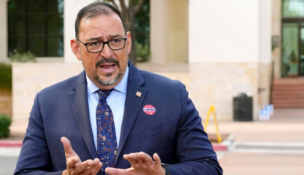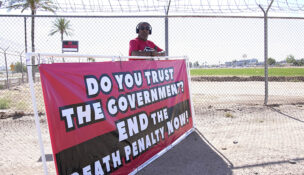Kory Langhofer: Litigating in a hostile new world
Kiera Riley Arizona Capitol Times//November 8, 2024//[read_meter]
Kory Langhofer: Litigating in a hostile new world
Kiera Riley Arizona Capitol Times//November 8, 2024//[read_meter]
Kory Langhofer started Statecraft, an Arizona-based political and government law firm, in 2015. Now, after close to a decade spent litigating on behalf of high-profile national and state Republicans, Langhofer reflects on the hostile transformation of political law.
How did you get to where you are now?
Honestly, there’s a lot of luck involved in it. I’d always liked politics … I was into it, but how do you do that? It’s very hard to do more than a one-off case in politics.
I started practicing law in New York for a little bit. Then, I was a federal prosecutor here. I’d been doing that for a couple years, and a good friend of mine who was interning at the US Attorney’s Office at the time – he and I have birthdays that are really similar to each other – so we were sitting in my back patio smoking cigars, as it happens, for our birthday, celebrating getting old. And he asked what I was gonna do after the US Attorney’s Office. I was like, I have no idea.
And he said, well, you should think about building Republican political practice, because, as it happens, all of the successful Republican attorneys either have just retired or become judges. So, I looked into it, and I’ll be damned, he was right. An intergenerational opening, I happened to be lucky.
Since you’ve entered the arena, how has political law changed?
It used to be fun … and it was pretty collegial. No one was trying to get someone else disbarred. I didn’t get any death threats. I think everyone who did it enjoyed it. And I don’t think that’s true now … It feels like a grind, and the cases are so adversarial. There’s always some sort of personal attack, at least in Arizona. I think it’s also true in other swing states. The purple states have it the worst.
I actually think the industry has changed, and the clients have changed. It used to be that the political people would have to win the campaign, and then the lawyers would do whatever cleanup was necessary, if necessary. Now it feels like about half of the Republican Party lawyering is thought of as being like the primary move, right. You’re not like messaging and knocking on doors, you’re litigating. Paradoxically, I should be like, fantastic, well, I’ll make more money. I have a bigger role in the campaign. I think that’s the wrong way of doing it. Like, I think it’s ineffective. And the best way, when you campaign, is to persuade voters that you’ll be a good politician, a good officeholder, instead of just suing the s*** out of everyone.
I don’t know how long that lasts. It’s already lasted longer than I expected it to. But how long can it go? Like, two more cycles, five more cycles, 10 more? Do we see an end? There aren’t really early signs of it breaking.
Where do you pinpoint the shift?
I think 2020 was a complete watershed. Relationships between lawyers completely soured after that on the two sides of the aisle. The silver lining is that it has also made almost every judge in the country very aware of political lawsuits. It has made every judge in the country very skeptical of political lawsuits on both sides. My own sense is that, basically, the courtroom is closed for all but exceptional cases at this point.
What have you experienced in the way of hostility?
When I get really good voicemails, I’ll send them to my family group chat. They’re funny. Usually they’re funny. I did have to send one to the FBI. And they knocked on the guy’s door, and they were like, stop it. Apparently, he lived below a soup shop in Manhattan. But he was fond of calling me at like two in the morning and sending me many sick messages. And eventually it got so bad that the FBI was like, OK, yeah, no.
Langhofer plays a voicemail he sent to the family group chat.
“Hi Kory, it’s Trevor. You just hung up on me. I just want to let you know that I think you’re a coward and a piece of s***, and I think you should rot in hell for eternity for abandoning President Trump and this country in the time of need. You should f***ing suffer.”
It’s not illegal. He’s not saying I will kill you, right? Like I have no reasonable fear.
We quit a certain engagement, and my phone started ringing with random people who would just be like, Why are you quitting? A lot of them said, “What have you done in your life? What kind of blackmail material do they have on you that you would give up and sell our country out to the left?” You’re just like, do you think that’s what happened? Do you think they caught me with a smoking gun? These are all people on the right. This isn’t the left. I get the same amount of hate mail from both sides
I don’t understand the psychology of it. They’re like, “You know what I’m gonna do right now. I’m going to look up this guy I’ve never met, I’m going to call him, I’m going to say some really mean things. That’ll show him.” What do you accomplish with that? Emails are actually pretty funny too. Why did you spend all this time writing this email?
How has your experience colored what you deem a good faith case? How judicious are you in choosing what you take on?
We probably turn away more cases than we take now. We think it’s important for clients long term, and for our own sanity that, when we show up and say, Judge, we think X, that they’re not thinking, ‘Aren’t you the guy who was in here last year and he said something really stupid? Why should I listen to you this time?” It’s important to have a minimum threshold quality.
There’s quite a few factors. First of all, a reasonable chance of winning. You can’t just waste time on these things, even if someone is like, I don’t care, I’ll shower you with money. If I can’t see a way of winning this, like we’re not doing it.
If it’s a post election dispute, we have a simple standard, which is, if you win, will it change the outcome? Does it matter if you win? A lot of people want to litigate tiny little things. This polling place closed for one hour because the power went out, or someone pulled the fire alarm … It might have interfered with someone’s right to vote, but did you lose by two votes? Is that why you lost? So we use the word materiality. If the issue isn’t material to the outcome, we don’t care.
A third criteria is quality of life, because the nature of the practice has changed so much. Even when you get a good paying client who is reputable, and there is a good point. There are engagements where you’re just like, I can’t do this anymore. It’s so stressful. So you have to think of your own sanity, I suppose.
What do you think makes a good election or political attorney?
If you are going to lose a case, the client has to hear it from you before the judge says it. You have to be able to assess the strength of your own case.
What insights have you gathered in past litigation?
There are unwritten rules. I’m comfortable calling them laws. They govern things like whether certain cases are worth filing, whether you have credible clients. You won’t find any of that written down and to the extent it is written down, it often says the opposite. Like if a lawyer takes a case, it doesn’t mean they endorse a client’s position. People don’t actually believe that.
If you have a client that is constantly saying things that are believed to be false, and then that client says something that is true, then it’s the boy who cried wolf problem. There is an unwritten law that the judges will assess the totality of people that are before them.
What do you think will be some of the existential challenges in this next election cycle?
There’s a new norm of prosecuting political opponents. I don’t mean that as a jab at the Democrats because they’ve been the ones doing it so far. I expect that if Republicans take law enforcement positions, they will be just as overzealous and maybe more so. I don’t know how you get off that train once it’s left the station. It feels like it’s careening out of control. As a consequence, it’s very unsafe to be involved in politics.
What are your goals for the next 10 years? Do you want to stay in political law?
If it stays like this, I definitely won’t be doing this in 10 years. It’s not sustainable with this tone and rancor. I don’t know what I’d be doing instead, but this is not hospitable.
What is something the average person might not know about you?
I’ve gotten really into biking. I went for a six week trip near the Camino de Santiago in Spain. I rode it on a mountain bike. I took a super pretty route. And that was great. You have to get away from it sometimes. This industry will drive you crazy if you let it.
What ethos guides you?
Professionally, we really value disagreement. Tom (Thomas Basile, Langhofer’s law partner) disagrees with me all the time, constantly. And embarrassingly, he’s usually right.
We want autonomous thought. I think that makes the workplace more interesting, but it significantly increases accuracy for our assessments and therefore helps clients make good decisions.
I don’t think I could say I have an ethos personally. Get to the end of the day and go to bed, that’s my personal ethos.


















